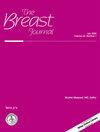Comparing the Prognoses of Breast-Conserving Surgeries for Differently Aged Women with Early Stage Breast Cancer: Use of a Propensity Score Method
IF 1.9
4区 医学
Q3 OBSTETRICS & GYNECOLOGY
引用次数: 1
Abstract
Background To explore the effect of age on the prognosis of patients with early stage breast cancer after breast-conserving surgery (BCS) and to provide references for young patients. Methods All clinical data of patients with early breast cancer undergoing BCS who were treated at Shengjing Hospital of China Medical University from January 2011 to May 2016 were obtained. The primary endpoints were local recurrence (LR) and distant recurrence, and the secondary endpoint was breast cancer-specific survival (BCSS). Chi-squared tests and Fisher's exact tests were used for statistical analysis. Disease-free survival (DFS) and BCSS were calculated by Kaplan–Meier survival analysis and compared using log-rank tests. Logistic regression was used for multivariable analysis of the effect of age in different subgroups. Propensity score matching (PSM) was used to reduce the bias confounding factors on oncological outcomes. Results Younger patients had higher Ki-67 expression (P=0.048) and larger tumors (P=0.042) compared to older patients. No other clinical features were significantly different between age groups. There was no significant difference between the two groups in BCSS (P=0.186); however, DFS was significantly different before PSM (P=0.012). Triple-negative breast cancer and Ki-67 positivity combined with younger age at diagnosis were associated with a higher risk of recurrence (P=0.018 and P=0.046, respectively). After PSM, there were no significant differences in BCSS nor DFS between the two age groups (P=0.559 and P=0.261, respectively). Conclusion BCS for young patients is not associated with increased DFS nor BCSS. However, young patients with triple-negative breast cancer and/or Ki-67 positivity have a poor prognosis. In sum, BCS may be appropriate for a subgroup of young patients.不同年龄癌症早期乳腺癌患者乳腺维持手术预后的比较:倾向评分法的应用
背景探讨年龄对癌症早期乳腺癌患者乳腺癌术后预后的影响,为青年患者提供参考。方法收集2011年1月至2016年5月在中国医科大学盛京医院接受BCS治疗的癌症早期患者的临床资料。主要终点为局部复发(LR)和远处复发,次要终点为乳腺癌特异性生存率(BCSS)。采用卡方检验和Fisher精确检验进行统计分析。通过Kaplan–Meier生存分析计算无病生存率(DFS)和BCSS,并使用对数秩检验进行比较。Logistic回归用于不同亚组中年龄影响的多变量分析。倾向评分匹配(PSM)用于减少肿瘤学结果的偏倚-混杂因素。结果与老年患者相比,年轻患者Ki-67表达较高(P=0.048),肿瘤较大(P=0.042)。其他临床特征在不同年龄组之间没有显著差异。BCSS在两组间无显著性差异(P=0.186);然而,在PSM之前DFS显著不同(P=0.012)。三阴性乳腺癌症和Ki-67阳性结合诊断时年龄较小与复发风险较高相关(分别为P=0.018和P=0.046)。PSM后,两个年龄组的BCSS和DFS没有显著差异(分别为P=0.559和P=0.261)。结论年轻患者的BCS与DFS和BCSS的增加无关。然而,患有癌症三阴性和/或Ki-67阳性的年轻患者预后较差。总之,BCS可能适用于年轻患者的亚组。
本文章由计算机程序翻译,如有差异,请以英文原文为准。
求助全文
约1分钟内获得全文
求助全文
来源期刊

Breast Journal
医学-妇产科学
CiteScore
4.00
自引率
0.00%
发文量
47
审稿时长
4-8 weeks
期刊介绍:
The Breast Journal is the first comprehensive, multidisciplinary source devoted exclusively to all facets of research, diagnosis, and treatment of breast disease. The Breast Journal encompasses the latest news and technologies from the many medical specialties concerned with breast disease care in order to address the disease within the context of an integrated breast health care. This editorial philosophy recognizes the special social, sexual, and psychological considerations that distinguish cancer, and breast cancer in particular, from other serious diseases. Topics specifically within the scope of The Breast Journal include:
Risk Factors
Prevention
Early Detection
Diagnosis and Therapy
Psychological Issues
Quality of Life
Biology of Breast Cancer.
 求助内容:
求助内容: 应助结果提醒方式:
应助结果提醒方式:


